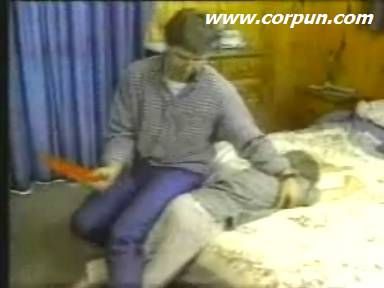|
Corpun file 11296 at www.corpun.com
The Globe and Mail, Toronto, 6 June 2003Group asks Supreme Court to outlaw spankingCanadian Press Ottawa -- Anti-spanking advocates carried their cause to the country's highest court Friday, arguing that corporal punishment of children should be outlawed as an affront to human dignity. "This case is about the right of children not to be hit, a right that in a modern, 21st century democracy should be unquestioned," lawyer Paul Schabas told the Supreme Court of Canada. He got a skeptical reception from some of the nine judges, who sharply questioned his legal reasoning. He also met vigorous opposition from the federal government, which maintained that, whatever the merits or pitfalls of spanking, parents should be free to resort to it in "mild to moderate" measure. At issue is Section 43 of the Criminal Code, enacted more than a century ago, which protects parents, teachers and other care-givers from prosecution for using "reasonable" force to discipline children. The Canadian Foundation for Children, Youth and the Law, a children's advocacy group, wants that legal immunity struck down as a violation of the Charter of Rights. "Section 43 has the effect of making children second-class citizens," Mr. Schabas contended on behalf of the foundation. He condemned the law as discriminatory, a violation of children's security of person and a legal green light for cruel and unusual punishment. Justices Charles Gonthier, Ian Binnie and Frank Iacobucci all questioned the need to overturn the law, noting that it guarantees immunity only for reasonable discipline, not for child abuse. Opinions may differ on what is reasonable but "that's a long way from saying (the law) is unconstitutional," observed Judge Binnie. Judge Gonthier took a similar view and suggested that striking down Section 43 could make parents liable to criminal charges for every smack on the bum. "Does the Charter require that we send people to prison if they use reasonable force?" he asked. Judge Iacobucci took issue with the foundation's claim that the law sends a message to parents that spanking is officially sanctioned by the government. "This is a defence to assault," he said. "It doesn't mean it's a value to be promoted." In fact, the federal Health Department has published brochures advising parents that spanking is not effective and ought to be avoided. That kind of educational effort is more apt to change parental practices than threatening people with assault convictions, said Roslyn Levine, a lawyer for the federal Justice Department. "The criminal law is a blunt instrument," she said. "Changing the criminal law does not necessarily change attitudes." Ms. Levine also maintained that parents need a "certain limited autonomy" in raising their children free of state interference, as long as their disciplinary methods do not cross the line and become abusive. The spanking law has been a bone of contention for decades, with lower-court judges wrestling repeatedly with where to draw the line. But this is the first time the Supreme Court has been asked to rule on its constitutionality. Ms. Levine urged the court to uphold the law, but also to set guidelines for lower-court judges to ensure greater consistency in its interpretation. For example, she noted, most experts in the field agree that spanking is a bad disciplinary technique for children under age two, or for teenagers. Using implements other than the open hand, striking children on the face or head, and leaving bruises or other lasting injuries are also widely seen as actions that should not be legally acceptable. Gregory Richards, a lawyer for the Ontario Association of Children's Aid Societies, argued that approach would do little to keep discipline from getting out of hand and turning into abuse. "Why is it we are so concerned with the rights of parents and teachers?" he asked. "Why do we shift the risk to the children?" The children's aid societies have joined in the challenge to Section 43, as have the Child Welfare League of Canada and the Quebec human rights commission. Supporting the government in its defence of the law are the Coalition for Family Autonomy, a collection of conservative lobby groups, and the Ontario Teachers Federation. The federation says it doesn't favour spanking, but it fears that if Section 43 is struck down teachers could face charges just for physically restraining unruly students. The court reserved judgment after three hours of argument. No date has been set for a decision. © 2003 Bell Globemedia Interactive Inc. All Rights Reserved.
|
About this website |

 CTV news version of the above story (2 minutes 30 seconds), same date (6 June 2003).
CTV news version of the above story (2 minutes 30 seconds), same date (6 June 2003).